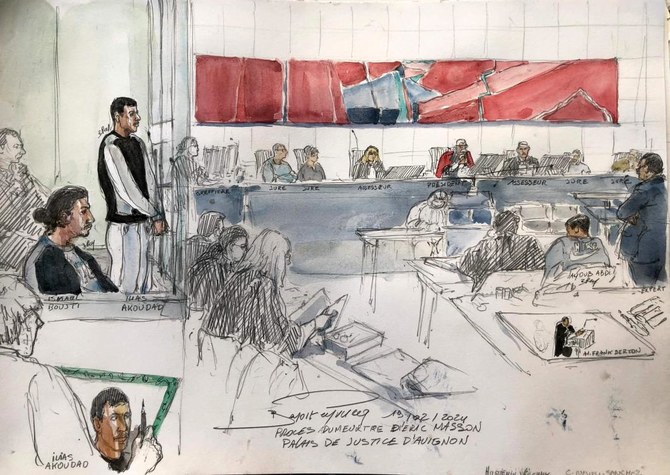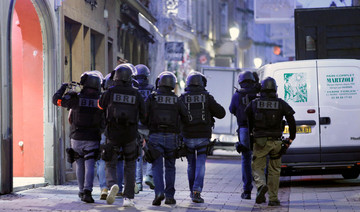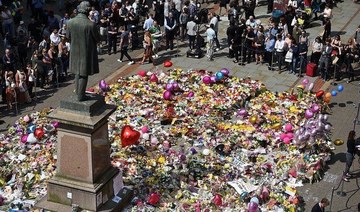PARIS: Four men went on trial on Thursday over a 2018 Christmas market attack in France’s eastern city of Strasbourg, with a key suspect insisting he did not know the plans of the radical Islamist who killed five people before being shot dead by police after a 48-hour manhunt.
The traditional Christmas market was in full swing on December 11 when Cherif Chekatt — a convicted criminal featured on a list of possible extremist security risks — opened fire on revellers, shouting “Allahu Akbar” (“God is Greatest” in Arabic).
The four men on trial in Paris are accused of crimes ranging from “terrorism” to helping supply weapons, including the 19th-century revolver Chekatt used in the attack.
The trial opened at the Paris court with the suspects confirming their names.
One of them, Audrey Mondjehi, faces the maximum penalty of life in prison if convicted of “terrorism.” The others risk 10 years imprisonment.
The trial, due to last until early April, is the latest legal process over the militant attacks that have hit France since 2015, with most of those in the dock accused of complicity since the actual perpetrators were generally killed while carrying out their attacks.
In December 2022, a Paris court convicted all eight suspects in the trial over a 2016 truck attack in the Mediterranean city of Nice, which left 86 dead, including the driver.
In the highest-profile case, 20 defendants were convicted in June 2022 over their roles in the November 2015 attack in the French capital, when 130 people were killed.
The Daesh group claimed the Strasbourg attack, but the then-French interior minister Christophe Castaner said it was taking credit for an attack it hadn’t planned.
A video pledging allegiance to the group was however found at the assailant’s home.
Of the accused only Mondjehi, 42, was charged with “terrorism,” while the three others — all in their 30s — face criminal conspiracy charges for their role in supplying weapons.
A fifth defendant, in his mid-80s, may be tried at a later date after a medical examination found his health was not compatible with taking part in the current long trial.
Mondjehi, a former cellmate of the assailant, played “a key role in supplying a weapon” by putting him in touch with sellers, and “could not have been unaware of, or may have even shared, all or part of Cherif Chekatt’s radical convictions,” according to the indictment.
Mondjehi told the court this was not true.
“Never could I have known that this weapon could have been for an attack,” he said.
His lawyer Michael Wacquez said he was concerned Mondjehi could be used as a scapegoat.
“Mondjehi should not be an outlet for the grief of the victims and should not be condemned because Cherif Chekatt is not there,” he said.
According to the investigation, there was no evidence of the other suspects having been aware of Chekatt’s plans.
Although Chekatt cannot now be brought to justice, survivors and relatives of victims said the trial was still crucial.
The attack “turned my whole life upside down,” said Mostafa Salhane, a 53-year-old former taxi driver who spent 15 terrifying minutes with Chekatt who climbed into his cab with a gun in his hand as he fled the scene.
A lawyer representing some of the families, Arnaud Friederich, said the trial was a “key moment” for his clients.
“There will be a before and an after,” he said.
Claude Lienhard, a lawyer for several dozen people, said there was a perception the investigation has been dragging on.
“There’s a fear that this will be a low-cost trial compared with other terror trials, as many feel they have been forgotten,” he said.
Audrey Wagner, who saw Chekatt wound one of her friends, said she expected proceedings to be “distressing” but important to “turn the page.”
Jean-Yves Bruckman, a now-retired firefighter who aided one of the victims said he needed answers “to heal.”
“One question keeps coming back to me: How can you kill someone like that?“
Four go on trial in France over 2018 Christmas market attack
https://arab.news/vsxdv
Four go on trial in France over 2018 Christmas market attack

- The four men on trial in Paris are accused of crimes ranging from “terrorism” to helping supply weapons
- The trial opened at the Paris court with the suspects confirming their names
Civilians evacuated from northeast Ukraine as Russia steps up assault

- Heavy fighting raged on Sunday as Russia attacks 27 settlements
KYIV: Thousands more civilians have fled Russia’s renewed ground offensive in Ukraine’s northeast that has targeted towns and villages with a barrage of artillery and mortar fire, officials said Sunday.
The intense battles have forced at least one Ukrainian unit to withdraw in the Kharkiv region, capitulating more land to Russian forces across less defended settlements in the so-called contested “gray zone” along the Russian border.
Meanwhile, a 10-story apartment block collapsed in the Russian city of Belgorod, near the border, with several deaths and injuries reported. Russian authorities said the building collapsed following Ukrainian shelling. Ukraine has not commented on the incident.
HIGHLIGHT
The Russian Defense Ministry said Saturday that Moscow’s forces had captured five villages on the border of Ukraine’s Kharkiv region and Russia. Ukraine’s leadership has not confirmed Moscow’s gains.
At least 4,000 civilians have fled the Kharkiv region since Friday, when Moscow’s forces launched the operation, Gov. Oleh Syniehubov said in a social media statement. Heavy fighting raged Sunday along the northeast front line, where Russian forces attacked 27 settlements in the past 24 hours, he said.
Analysts say the Russian push is designed to exploit ammunition shortages before promised Western supplies can reach the front line. Ukrainian soldiers said the Kremlin is using the usual Russian tactic by launching a disproportionate amount of fire and infantry assaults to exhaust their troops and firepower.
It comes after Russia stepped up attacks in March targeting energy infrastructure and settlements, which analysts predicted were a concerted effort by Moscow to shape conditions for an offensive.
Ukrainian President Volodymyr Zelenskyy said that disrupting Russia’s offensive in the area was a priority, and that Kyiv’s troops were continuing counteroffensive operations in seven villages around the Kharkiv region.
“Disrupting the Russian offensive intentions is our number one task now. Whether we succeed in that task depends on every soldier, every sergeant, every officer,” Zelenskyy said.
The Russian Defense Ministry said Saturday that Moscow’s forces had captured five villages on the border of Ukraine’s Kharkiv region and Russia. These areas were likely poorly fortified due to the dynamic fighting and constant heavy shelling, easing a Russian advance.
Ukraine’s leadership has not confirmed Moscow’s gains.
Black, Asian and minority ethnic people make up nearly 70% of UK’s anti-terror detentions, data shows

- Fewer than 1 in 5 who were stopped were recorded as white
LONDON: Nearly 70 percent of people stopped at UK ports under anti-terrorism laws since 2021 were from Black, Asian and minority ethnic backgrounds, new figures released on Sunday show.
The Guardian newspaper requested police data under freedom of information laws, which also revealed fewer than one in five who were stopped were recorded as white.
Campaigners have criticized the statistics, saying they prove the UK’s anti-terrorism laws are disproportionately affecting Black and minority ethnic groups and not being used effectively enough to arrest the rise of far-right, white extremism, The Guardian reported.
Of the 8,095 people stopped at UK ports since 2021 under Schedule 7 of the Terrorism Act 2000, 5,619 (69.4 percent) were recorded as being from Black, Asian and minority ethnic backgrounds, compared with 1,585 (19.6 percent) recorded as white British, white Irish or white other stopped under the same law.
The head of public advocacy at the anti-Islamophobia group Cage International has also pressed British police to publish data on the religious background of those stopped under the Terrorism Act.
Anas Mustapha said: “This new data reaffirms what we already know about its racist and Islamophobic impact. However, despite evidence demonstrating that the majority of those stopped are Muslim and that forces record data on religion, the government has resisted calls to produce a religious breakdown of those harassed at the borders.
“Schedule 7 is one of the most intrusive and discriminatory of all police powers. We’ve supported hundreds of British holidaymakers impacted by the policy and it’s clear that the power is abused and must be repealed.”
A spokesman from the UK’s counter-terrorism police said the law was a “vital tool” in collecting evidence to support convictions of terrorists, as well as helping with intelligence-gathering in the prevention of attacks on British streets.
“The use of Schedule 7 powers regularly features in some of our most complex and high-risk investigations and prosecutions,” the spokesman said.
“We face an enduring terrorist threat from overseas, and whilst we are seeing a much greater prevalence of online activity, travel remains an element of terrorist methodology that provides us with potentially crucial opportunities to act.
“Where the powers are used, there are a range of robust safeguards and measures in place to ensure appropriate usage.”
OIC calls for immediate aid amid Afghan flood crisis

- Flash floods from seasonal rains in Baghlan province in northern Afghanistan
RIYADH: The Organization of Islamic Cooperation has issued an urgent appeal to its member states as well as relief organizations to provide aid to the Afghan people amid catastrophic flooding which has hit the country, Saudi Press Agency reported on Sunday.
Flash floods from seasonal rains in Baghlan province in northern Afghanistan killed at least 315 people since striking on Friday, a UN report said.
Rains also caused heavy damage in northeastern Badakhshan province and central Ghor province, officials said.
Since mid-April, floods have left about 100 people dead in 10 of Afghanistan’s provinces, with no region entirely spared, according to authorities.
Farmland has been swamped in a country where 80 percent of the more than 40 million people depend on agriculture to survive.
UK investigating Hamas’ claim that British hostage killed in Gaza

- Foreign secretary confirms viewing video
LONDON: The UK’s Foreign Office said on Sunday it was investigating a claim by Hamas that a British-Israeli hostage in Gaza had died from injuries sustained in an Israeli airstrike over a month ago.
Nadav Popplewell, 51, was captured along with his mother Channah Peri on Oct. 7 during a border incursion when the Palestinian group launched a surprise attack on Israel.
The Foreign Office said it was actively seeking more information on the matter.
Popplewell’s family has requested media outlets refrain from airing footage released by Hamas, showing him in captivity with visible injuries, the BBC reported.
The UK’s Foreign Secretary David Cameron, speaking to the BBC’s Laura Kuenssberg, confirmed viewing the video but provided no further updates on the investigation.
Cameron said: “We don’t want to say anything until we have better information.”
He described Hamas as “callous” for releasing the video and playing “with the family’s emotions in that way.”
The Foreign Office added that the department’s thoughts “are with his family at this extremely distressing time.”
The Israeli military has not issued a statement on the matter.
Israel’s military campaign in Gaza to destroy Hamas has killed over 34,900 people, the majority of whom are women and children, according to the Gaza Health Ministry.
Israel has reported that 128 hostages are unaccounted for.
UK mountaineer logs most Everest climbs by a foreigner, Nepali makes 29th ascent

- Both climbers used Southeast Ridge route to summit
- They were on separate expeditions guiding their clients
KATMANDU: A British climber and a Nepali guide have broken their own records for most climbs of Mount Everest, the world’s highest mountain, hiking officials said on Sunday.
Rakesh Gurung, director of Nepal’s Department of Tourism, said Britain’s Kenton Cool, 50, and Nepali guide Kami Rita Sherpa, 54, climbed the 8,849-meter (29,032 foot) peak for the 18th and 29th time, respectively.
They were on separate expeditions guiding their clients.
“He just keeps going and going... amazing guy!” Garrett Madison of the US-based expedition organizing company Madison Mountaineering said of the Nepali climber. Madison had teamed up with Kami Rita to climb the summits of Everest, Lhotse, and K2 in 2014.
K2, located in Pakistan, is the world’s second-highest mountain and Lhotse in Nepal is the fourth-tallest.
Lukas Furtenbach of the Austrian expedition operator Furtenbach Adventures called Cool’s feat remarkable.
“He is a fundamental part of the Everest guiding industry. Kenton Cool is an institution,” Furtenbach, who is leading an expedition from the Chinese side of Everest, told Reuters.
Both climbers used the Southeast Ridge route to the summit.
Pioneered by the first summiteers, New Zealander Sir Edmund Hillary and Sherpa Tenzing Norgay in 1953, the route remains the most popular path to the Everest summit.
Kami Rita first climbed Everest in 1994 and has done so almost every year since, except for three years when authorities closed the mountain for various reasons.
He climbed the mountain twice last year.
Mountain climbing is a major tourism activity and a source of income as well as employment for Nepal, home to eight of the world’s 14 tallest peaks, including Everest.
Nepal has issued 414 permits, each costing $11,000 to climbers for the climbing season that ends this month.


















